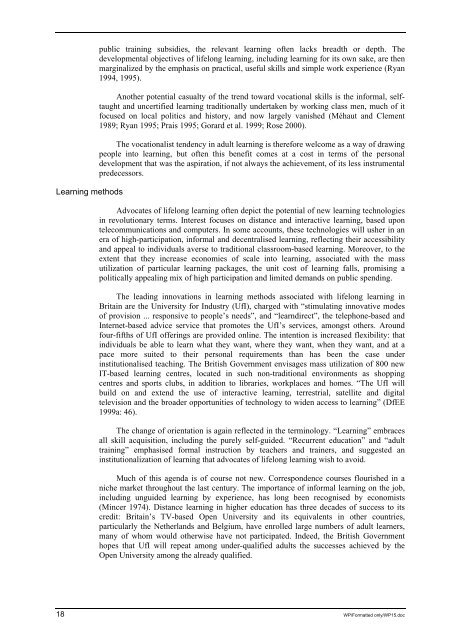Lifelong learning - International Labour Organization
Lifelong learning - International Labour Organization
Lifelong learning - International Labour Organization
You also want an ePaper? Increase the reach of your titles
YUMPU automatically turns print PDFs into web optimized ePapers that Google loves.
Learning methods<br />
public training subsidies, the relevant <strong>learning</strong> often lacks breadth or depth. The<br />
developmental objectives of lifelong <strong>learning</strong>, including <strong>learning</strong> for its own sake, are then<br />
marginalized by the emphasis on practical, useful skills and simple work experience (Ryan<br />
1994, 1995).<br />
Another potential casualty of the trend toward vocational skills is the informal, selftaught<br />
and uncertified <strong>learning</strong> traditionally undertaken by working class men, much of it<br />
focused on local politics and history, and now largely vanished (Méhaut and Clement<br />
1989; Ryan 1995; Prais 1995; Gorard et al. 1999; Rose 2000).<br />
The vocationalist tendency in adult <strong>learning</strong> is therefore welcome as a way of drawing<br />
people into <strong>learning</strong>, but often this benefit comes at a cost in terms of the personal<br />
development that was the aspiration, if not always the achievement, of its less instrumental<br />
predecessors.<br />
Advocates of lifelong <strong>learning</strong> often depict the potential of new <strong>learning</strong> technologies<br />
in revolutionary terms. Interest focuses on distance and interactive <strong>learning</strong>, based upon<br />
telecommunications and computers. In some accounts, these technologies will usher in an<br />
era of high-participation, informal and decentralised <strong>learning</strong>, reflecting their accessibility<br />
and appeal to individuals averse to traditional classroom-based <strong>learning</strong>. Moreover, to the<br />
extent that they increase economies of scale into <strong>learning</strong>, associated with the mass<br />
utilization of particular <strong>learning</strong> packages, the unit cost of <strong>learning</strong> falls, promising a<br />
politically appealing mix of high participation and limited demands on public spending.<br />
The leading innovations in <strong>learning</strong> methods associated with lifelong <strong>learning</strong> in<br />
Britain are the University for Industry (UfI), charged with “stimulating innovative modes<br />
of provision ... responsive to people’s needs”, and “learndirect”, the telephone-based and<br />
Internet-based advice service that promotes the UfI’s services, amongst others. Around<br />
four-fifths of UfI offerings are provided online. The intention is increased flexibility: that<br />
individuals be able to learn what they want, where they want, when they want, and at a<br />
pace more suited to their personal requirements than has been the case under<br />
institutionalised teaching. The British Government envisages mass utilization of 800 new<br />
IT-based <strong>learning</strong> centres, located in such non-traditional environments as shopping<br />
centres and sports clubs, in addition to libraries, workplaces and homes. “The UfI will<br />
build on and extend the use of interactive <strong>learning</strong>, terrestrial, satellite and digital<br />
television and the broader opportunities of technology to widen access to <strong>learning</strong>” (DfEE<br />
1999a: 46).<br />
The change of orientation is again reflected in the terminology. “Learning” embraces<br />
all skill acquisition, including the purely self-guided. “Recurrent education” and “adult<br />
training” emphasised formal instruction by teachers and trainers, and suggested an<br />
institutionalization of <strong>learning</strong> that advocates of lifelong <strong>learning</strong> wish to avoid.<br />
Much of this agenda is of course not new. Correspondence courses flourished in a<br />
niche market throughout the last century. The importance of informal <strong>learning</strong> on the job,<br />
including unguided <strong>learning</strong> by experience, has long been recognised by economists<br />
(Mincer 1974). Distance <strong>learning</strong> in higher education has three decades of success to its<br />
credit: Britain’s TV-based Open University and its equivalents in other countries,<br />
particularly the Netherlands and Belgium, have enrolled large numbers of adult learners,<br />
many of whom would otherwise have not participated. Indeed, the British Government<br />
hopes that UfI will repeat among under-qualified adults the successes achieved by the<br />
Open University among the already qualified.<br />
18 WP/Formatted only/WP15.doc

















